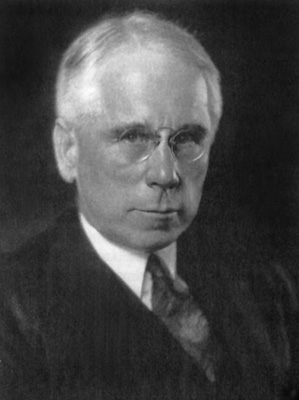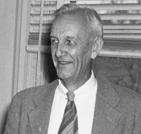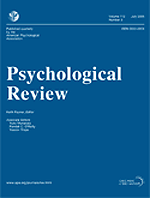
John Broadus Watson was an American psychologist who popularized the scientific theory of behaviorism, establishing it as a psychological school. Watson advanced this change in the psychological discipline through his 1913 address at Columbia University, titled Psychology as the Behaviorist Views It. Through his behaviorist approach, Watson conducted research on animal behavior, child rearing, and advertising, as well as conducting the controversial "Little Albert" experiment and the Kerplunk experiment. He was also the editor of Psychological Review from 1910 to 1915. A Review of General Psychology survey, published in 2002, ranked Watson as the 17th most cited psychologist of the 20th century.

James Mark Baldwin was an American philosopher and psychologist who was educated at Princeton under the supervision of Scottish philosopher James McCosh and who was one of the founders of the Department of Psychology at Princeton and the University of Toronto. He made important contributions to early psychology, psychiatry, and to the theory of evolution.

James McKeen Cattell was the first professor of psychology in the United States, teaching at the University of Pennsylvania in Philadelphia. He was a long-time editor and publisher of scientific journals and publications, including Science, and served on the board of trustees for Science Service, now known as Society for Science from 1921 to 1944.

Margaret Floy Washburn, was a leading American psychologist in the early 20th century, was best known for her experimental work in animal behavior and motor theory development. She was the first woman to be granted a PhD in psychology (1894); the second woman, after Mary Whiton Calkins, to serve as president of the American Psychological Association (1921); and the first woman elected to the Society of Experimental Psychologists. A Review of General Psychology survey, published in 2002, ranked Washburn as the 88th most cited psychologist of the 20th century, tied with John Garcia, James J. Gibson, David Rumelhart, Louis Leon Thurstone, and Robert S. Woodworth.

James Rowland Angell was an American psychologist and educator who served as the 16th President of Yale University between 1921 and 1937. His father, James Burrill Angell (1829–1916), was president of the University of Vermont from 1866 to 1871 and then the University of Michigan from 1871 to 1909.
Psychology is defined as "the scientific study of behavior and mental processes". Philosophical interest in the human mind and behavior dates back to the ancient civilizations of Egypt, Persia, Greece, China, and India.

Robert Sessions Woodworth was an American psychologist and the creator of the personality test which bears his name. A graduate of Harvard and Columbia, he studied under William James along with other prominent psychologists as Leta Stetter Hollingworth, James Rowland Angell, and Edward Thorndike. His textbook Psychology: A study of mental life, which appeared first in 1921, went through many editions and was the first introduction to psychology for generations of undergraduate students. His 1938 textbook of experimental psychology was scarcely less influential, especially in the 1954 second edition, written with Harold H. Schlosberg.

Lightner Witmer was an American psychologist. He introduced the term "clinical psychology" and is often credited with founding the field that it describes. Witmer created the world's first "psychological clinic" at the University of Pennsylvania in 1896, including the first journal of clinical psychology and the first clinical hospital school in 1907.

The Psychological Bulletin is a monthly peer-reviewed academic journal that publishes evaluative and integrative research reviews and interpretations of issues in psychology, including both qualitative (narrative) and/or quantitative (meta-analytic) aspects. The editor-in-chief is Blair T. Johnson.
K. Anders Ericsson was a Swedish psychologist and Conradi Eminent Scholar and Professor of Psychology at Florida State University who was internationally recognized as a researcher in the psychological nature of expertise and human performance.

Nora S. Newcombe is the Laura H. Carnell Professor of Psychology and the James H. Glackin Distinguished Faculty Fellow at Temple University. She is a Canadian-American researcher in cognitive development, cognitive psychology and cognitive science, and expert on the development of spatial thinking and reasoning and episodic memory. She was the principal investigator of the Spatial Intelligence and Learning Center (2006-2018), one of six Science of Learning Centers funded by the National Science Foundation.

Howard Crosby Warren was an American psychologist and the first chairman of the Princeton University Psychology department. He was also president of the American Psychological Association in 1913.
John Wallace Baird was a Canadian psychologist. He was the 27th president of the American Psychological Association (1918). He was the first Canadian, and only the second non-American, to hold the office. He was also a founding editor of the Journal of Applied Psychology, and served in subordinate editorial capacities for Psychological Review, American Journal of Psychology, and the Journal of Educational Psychology. At his death in 1919, he was the designate to succeed Granville Stanley Hall as president of Clark University in Worcester, Massachusetts.
The following outline is provided as an overview of and topical guide to human intelligence:

George Malcolm Stratton was an American psychologist who pioneered the study of perception in vision by wearing special glasses which inverted images up and down and left and right. He studied under one of the founders of modern psychology, Wilhelm Wundt, and started one of the first experimental psychology labs in America, at the University of California, Berkeley. Stratton's studies on binocular vision inspired many later studies on the subject. He was one of the initial members of the philosophy department at Berkeley, and the first chair of its psychology department. He also worked on sociology, focusing on international relations and peace. Stratton presided over the American Psychological Association in 1908, and was a member of the National Academy of Sciences. He wrote a book on experimental psychology and its methods and scope; published articles on the studies at his labs on perception, and on reviews of studies in the field; served on several psychological committees during and after World War I; and served as advisor to doctoral students who would go on to head psychology departments.
Knight Dunlap was an American psychologist. He founded the Journal of Psychology, was the first editor of the Journal of Comparative Psychology, and was the President of the American Psychological Association. Dunlap authored numerous books and articles regarding psychology and was a talented inventor. His concentration was in experimental psychology and some of his best known inventions were the Dunlap chronoscope, the Dunlap tapping plate, and the Dunlap chair for vestibular investigation.

Walter Richard Miles was an American psychologist and a president of the American Psychological Association (APA). He best known for his development of the two-story rat maze, his research on low dose alcohol, the development of red night vision goggles for aviation pilots, and the reduction of performance in aging individuals. However, the theme of his academic career was his fascination with apparatuses to measure behavior. C. James Goodwin (2003) noted that Miles "never became a leading figure in any particular area of research in psychology... but drifted from one area to another, with the direction of the drift determined often by the presence of a particular type of apparatus or an apparatus-related problem that intrigued him" (p. 58).
The Eastern Psychological Association is a professional organization for psychologists in the Eastern United States. It holds annual meetings where members present their research findings to colleagues. Established in 1896, it is the oldest regional psychological organization in the United States.
Dare Ann Baldwin is a scientist known for her research on learning mechanisms and early social skills of infants and young children. Baldwin is a professor of psychology at Oregon University. Baldwin is the recipient of various awards including the 1994 Boyd McCandless Award from Division 7 of the American Psychological Association, 1995 John Merck Scholars Award, 1997 APA Distinguished Scientific Award for Early Career Contribution to Psychology, 2006-2007 James McKeen Cattell Sabbatical Fellowship, 2006 John Simon Guggenheim Memorial Fellowship, 2006-2007 University of Oregon Fund for Faculty Excellence Award, and 2018 University of Oregon Faculty Research Award.
Walter Kintsch was an American psychologist and academic who was Professor Emeritus of Psychology at the University of Colorado Boulder. He was renowned for his groundbreaking theories in cognitive psychology, especially in relation to text comprehension.












